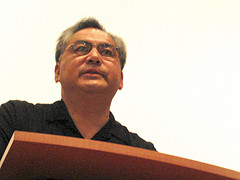Jeff Tagami, 'October Light' (Kearny Street Workshop Press, 1987)
I've previously reviewed Central Valley poet Jeff Tagami's October Light, for the International Examiner's Pacific Reader at the time of the book's third printing. October Light, Tagami's first and thus far only collection of poetry, was originally published in 1987 by San Francisco-based, Manilatown-founded Kearny Street Workshop.

Tagami appeared in the PBS television series, United States of Poetry (1995), which featured his poem, "Song of Pajaro":
Pajaro the men thigh deep in mud
who are cutting cauliflower
the tractor they must depend
to pull them out
the catering truck selling hot coffeePajaro the children who clean
the mud from their father's boots
They sleep They wake
to the smell of cauliflower growing
in fields that are not dreams
fields that begin under their bedroom windows
and end in a world they do not know
from the mountains to the river
from the river to the beachNow Pajaro is tired It wants to sleep
The packing sheds shut down for the night
The trucks close their trailer doors
and the Southern Pacific leaves town
(having got what it wanted)This Pajaro of my mother leaving work
who at this moment is crossing the bridge of no lights
in her Buick Electra with wings like a huge bird
crossing over the black river toward home
where she will make the sign of the cross
over the cooked rice in the name of the Lord
and prepare for the table
a steaming plate of cauliflower
In the video, we see a younger Tagami standing in a field of cauliflower, amid workers stooped over, cutting, and cutting, and cutting. We see the house at the border of the cauliflower fields, the trucks and trains loaded and moving into the horizon. We see a woman carving the sign of the cross into a pot of steamed rice, as the family gathers around the table. Pajaro (the river, the town) is everything; cauliflower is everywhere.
That's the thing about Tagami; for him, the Central Valley is everything. A second generation Filipino American, he was born in Watsonville, and as a poet, activist, and educator, he's remained very close to home, living, teaching, and raising his family with his wife, poet Shirley Ancheta there. Tagami's loyalty to place and its people is one of his strongest traits as a poet.
As the son of field and packing shed workers, his poetry shows us very concretely and bluntly, this world of low wages, dangerous machinery taking fingers or an entire hand, isolated Filipino bachelors:
Desire, not loneliness
bought me tickets
to hang around my neck
like a braided rope
until we were a flock
of men unashamed
to spend a week's wage
for a dance.Yes, a man gets lonely,
but he has to do something
to stop from going crazy.
And it's not craziness
to buy a '29 Model T
and drive to Watsonville
to Lompoc, San Pedro
to Oxnard and back again
past the neatly clipped lawns
of white neighborhoods
where they are not wanted
in a country
where they are not welcome.
And to do this over and over
like a man slapping
his own face again and again.
Above is an excerpt of the poem, "Tobera," as in Fermin Tobera, the young Filipino agricultural laborer murdered in the Watsonville race riots of 1930, by three white high school students. Tobera was murdered because Filipino laborers were dancing with white women in the taxi dance halls. This is the legacy into which Tagami was born.
If we are fortunate, we will see a second (and third, and fourth, and so on) collection of poetry from Jeff Tagami. For now, October Light continues to be one of the books of poetry revered by West Coast Filipino Americans, because it is evidence, not simply of our having been here and of this place, but of the community's insistence upon thriving despite institutional odds.
Barbara Jane Reyes was born in Manila, the Philippines, and grew up in the San Francisco Bay area. She...
Read Full Biography

